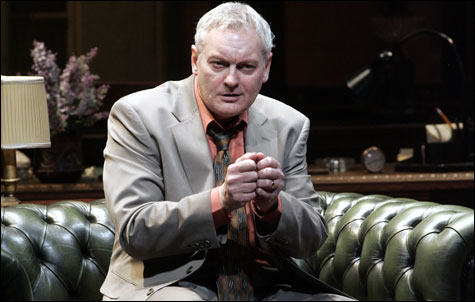
SHINING CITY: McPherson’s therapy play brings new meaning to the term “transference.” |
The cupboards of Irish dramaturgy are crammed with ghosts. And in the larder of Conor McPherson, ectoplasm crowds even Jameson’s off the shelf. In the 36-year-old McPherson’s Olivier Award–winning The Weir, a gaggle of men shoot the supernatural shit in a rural Irish bar — until a visiting young woman’s poignant account of her own telephonic trafficking with the dead knocks them off their pins. St. Nicholas conjures up vampires in suburban London, and The Seafarer, currently running on Broadway, brings Beelzebub himself to a pickled poker game. The Tony-nominated Shining City, making its Boston debut in a joint production by Chicago’s Goodman Theatre and the Huntington Theatre Company (at the Boston University Theatre through April 6), hinges on a man who sees dead people. Well, one in particular: his recently deceased wife, whose demon he seeks to exorcise in a therapist’s office. Shining City is for most of its 90 minutes a subtle and compassionate work about rootlessness and disconnection, with a twist at the end that brings new meaning to the term “transference.” Whether you consider this coup de théâtre the apogee or the ruination of the play will probably determine your opinion of it. For me, it puts a knick in the integrity of the piece but cannot knock the polish off the pained and self-depreciating tale told by insomniac patient John or the beautifully acted production at the Huntington directed by Goodman honcho Robert Falls, who also helmed the 2006 Broadway staging.
Shining City was the first play McPherson wrote after his pancreas ruptured on an opening night in 2001, sending him to hospital, Alcoholics Anonymous, and therapy. Much of what he gleaned from the last can be summed up in the shrink’s equivalent of “Physician, heal thyself.” As McPherson has observed, you don’t go into psychotherapy — or, perhaps, playwriting — without a certain attraction to dysfunction. In this case, therapist Ian is no Sigmund Freud or even Dr. Phil. A lapsed priest, he has been supported through a “course” in psychotherapy by a young woman who has recently borne his child — and from whom he is endeavoring to escape, leaving her and the baby in a borrowed lair at his brother’s house while he sleeps in the dingy Dublin office where he has just set up shop. The troubled John, who is coming apart too rapidly to have waited weeks to see a more qualified therapist, may be his only client. The business of the play lies in how the reticent Ian is influenced by the garrulous John’s revelations of marital dissatisfaction, guilt, and aborted adultery. In brief scenes with the girlfriend and then with the most hangdog hustler in history that are interspersed with Ian’s three encounters with John, the therapist’s actions seem to have been pricked by his client’s experience.

The Huntington production is set in a towering workplace of shabby grandeur designed by Santo Loquasto, through the windows of which are glimpsed a Dublin roofscape and a lowering sky. Distant church bells compete with melancholy tunes of Gene Clark and Neil Young that mark the scene breaks. A burly cross between Brian Dennehy (whom Falls directed in Death of a Salesman and Long Day’s Journey into Night) and the wispier Frank McCourt, John Judd gives a larger-than-life performance as the frightened John. He seems to take up the entire therapist’s couch, rocking back and forth as he forces his tale out of himself, then relaxes into it in a way that’s cocky and anguished at once. As Ian, a contained Jay Whittaker does little more than coax John’s confessions, translating them into his own off-hours life of quiet agitation. Keith Gallagher makes a tender sad sack of a pick-up, and Nicole Wiesner brings vitality as well as incredulity to the girlfriend being dumped. As for what John dumps on Ian, it may be metaphoric proof that you can leave your troubles on your therapist’s door. But if that were actually true, wouldn’t every mental-health clinic on the planet be Spooky World?
Actors’ Shakespeare Project removes Shakespeare’s valedictory, The Tempest, to a Victorian music hall where Prospero presides as resident magician. In red-lined cape, glittering vest, and top hat, advancing onto a thrust stage bordered by bulb lights, he seems poised to saw Ariel in half. Of course, Shakespeare’s alter ego has bigger magical fish to fry. Near the top of the production (at Cambridge Multicultural Arts Center through April 13), the distinguished actor Alvin Epstein, as Prospero, comes forward carrying a hoop with which he encompasses a ship’s model on a tiny table, triggering the weather event of the title. The delicate ship rises on a spume of white cloth that becomes the tossing sea, out from under which storm-tossed characters peep to convey orders and display panic. It’s a toy-theater tempest as might have been enacted in a Victorian parlor. And it works better than some of the effects emanating from director Patrick Swanson’s framing device for the play. Especially jarring is the masque Prospero conjures for daughter Miranda and the brave new specimen who has washed up to be her spouse. Here it’s a clown show with red-nosed guys in dresses giving sing-song readings of the goddesses’ lines. Even if the enchanted island of the play were indeed a Victorian stage, why would Prospero choose to favor his daughter and her intended with a celestial slip on a banana peel?